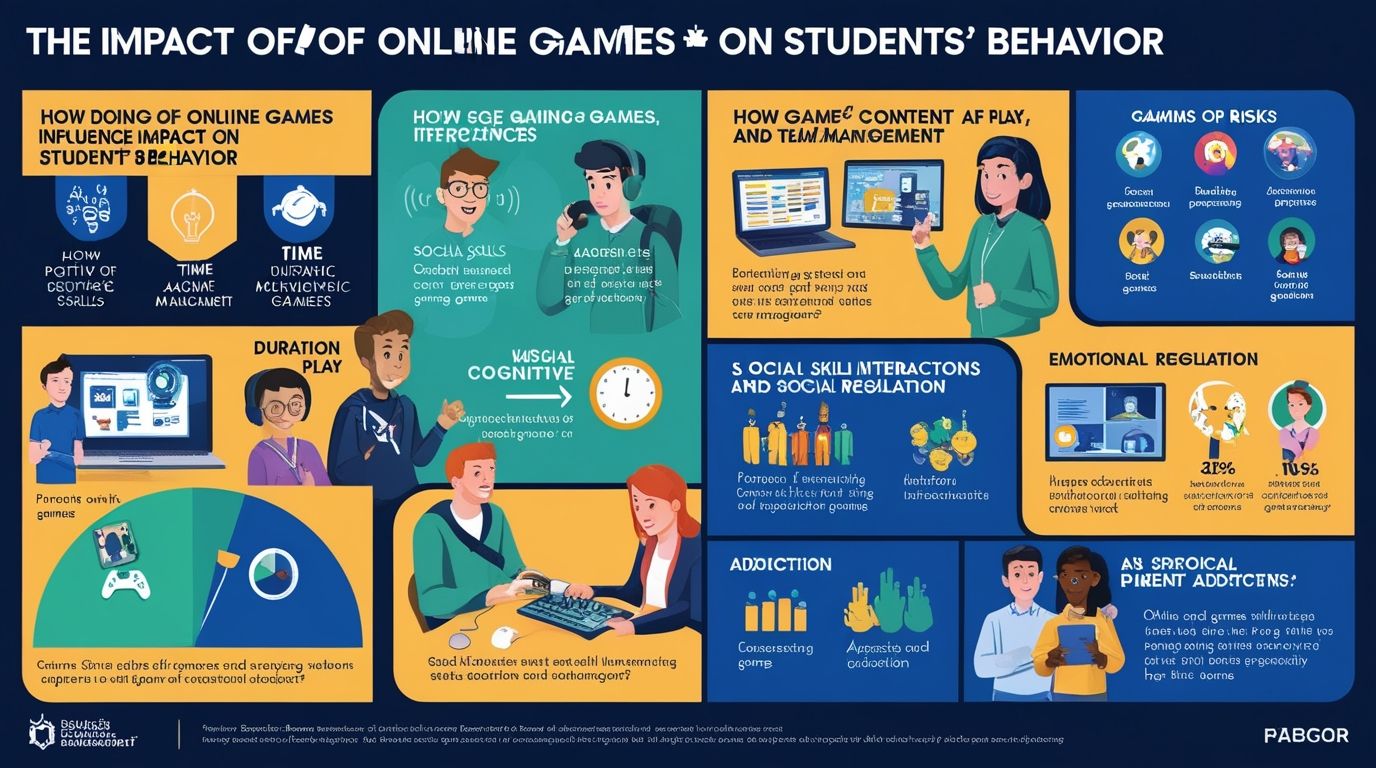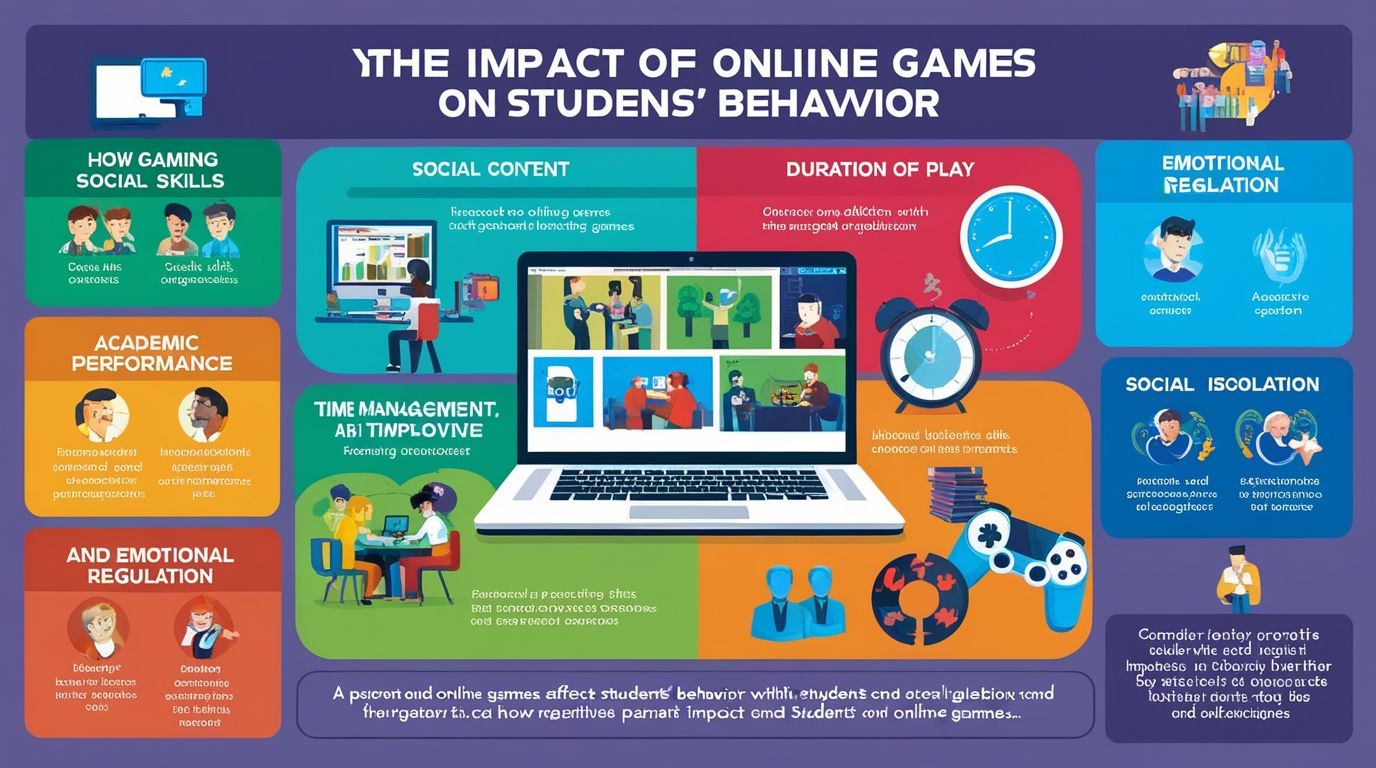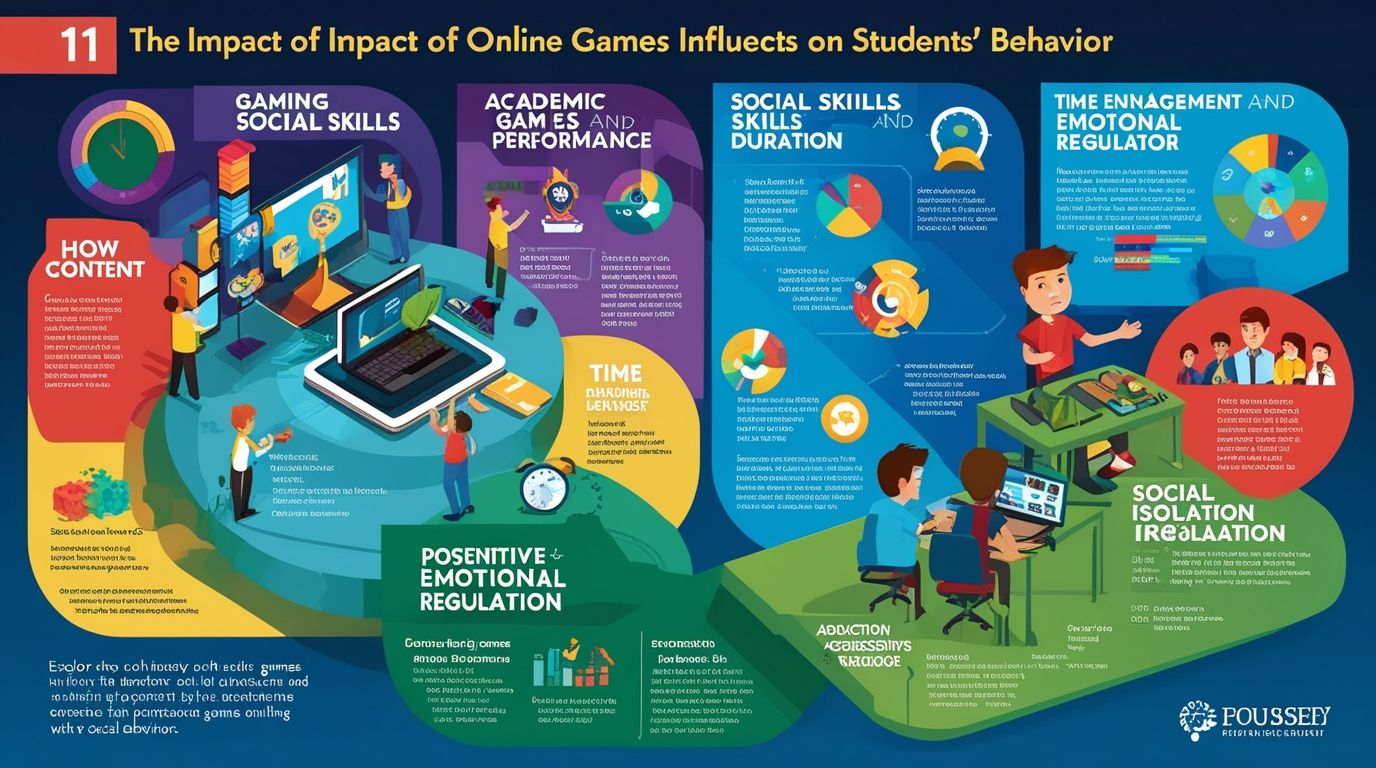The Impact of Online Games on Students’ Behavior In recent years, online gaming has become a significant part of students’ lives. From sprawling virtual worlds to quick mobile games, the appeal of online gaming is undeniable. However, as these digital playgrounds grow, concerns about their impact on students’ behavior have also risen. Are online games merely harmless fun, or do they pose a deeper influence on young minds? This article explores the multifaceted impact of online gaming on students’ behavior, examining both the positive and negative effects.
The Allure of Online Games: Why Students Play
The allure of online games lies in their ability to provide instant gratification, social interaction, and a sense of achievement. For students, these games offer a temporary escape from academic pressures and a chance to immerse themselves in alternate realities where they can be heroes, strategists, or simply have fun with friends. According to Przybylski et al. (2010), online games appeal to basic psychological needs, such as autonomy, competence, and relatedness, making them a powerful draw for students seeking a break from the real world.
Games like “Minecraft” or “Fortnite” offer more than just entertainment—they provide platforms for creativity, collaboration, and strategic thinking. In a classroom setting, educators have even harnessed games for educational purposes, using them to teach subjects like history, math, and even coding (Granic et al., 2014). However, beyond the classroom, the impact of these games on students’ behavior is more complex and multifaceted.
Positive Impacts: Skills and Social Connections
1. Cognitive Skills Development:
One of the positive impacts of online games is their potential to enhance cognitive skills. Games that require strategic planning, quick decision-making, and problem-solving can help sharpen these abilities in students. For instance, real-time strategy games often require players to think several steps ahead, manage resources, and make split-second decisions. Research has shown that playing these types of games can improve students’ cognitive flexibility, attention, and spatial reasoning (Bavelier et al., 2012).
2. Social Connections and Teamwork:
Online games are not just solo activities; many involve multiplayer modes that encourage collaboration and communication. Games like “Among Us” or “League of Legends” require players to work together to achieve common goals, fostering teamwork and social skills. For students who may struggle with face-to-face interactions, online games offer a platform to connect with peers, build friendships, and develop social confidence (Granic et al., 2014). The shared experiences within these games can create strong bonds and provide a sense of belonging, particularly for those who feel isolated in their offline lives.
3. Persistence and Resilience:
Online games often involve challenges and obstacles that players must overcome. This trial-and-error process teaches students persistence and resilience as they learn to cope with failure and continue striving toward success. This mindset can be valuable in academic and personal contexts, helping students develop a growth mindset and the ability to handle setbacks more effectively.

Negative Impacts: Addiction and Behavioral Changes
Despite these positive aspects, the negative impacts of online gaming on students’ behavior are significant and warrant careful consideration.
1. Risk of Addiction:
One of the most concerning effects of online gaming is the risk of addiction. The immersive nature of games, combined with their reward systems, can lead students to spend excessive amounts of time playing, often at the expense of their studies, physical activity, and sleep. The World Health Organization has recognized gaming disorder as a mental health condition, characterized by impaired control over gaming, prioritization of gaming over other interests, and continued gaming despite negative consequences (WHO, 2018). Excessive gaming can lead to a decline in academic performance, as students may neglect their homework or stay up late to play, resulting in fatigue and decreased focus in school. Furthermore, the addictive nature of games can lead to social withdrawal, where students prefer virtual interactions over real-life connections, potentially stunting their social development.
2. Aggressive Behavior and Desensitization:
Violent online games, in particular, have been scrutinized for their potential to influence aggressive behavior in students. Games that involve combat, shooting, or other forms of violence may desensitize players to real-world violence, leading to an increase in aggressive thoughts, emotions, and behaviors. A meta-analysis by Anderson et al. (2010) found that exposure to violent video games is associated with increased aggression and decreased empathy in players, although the extent of this impact can vary based on individual susceptibility and the amount of time spent playing.
3. Impact on Physical Health:
Another negative aspect of excessive online gaming is its impact on students’ physical health. Prolonged screen time can lead to issues such as eye strain, poor posture, and a sedentary lifestyle, which in turn can contribute to obesity and related health problems. Additionally, the lack of physical activity associated with extended gaming sessions can detract from time spent outdoors or participating in sports, which are essential for overall well-being and development.

Finding the Balance: Guidelines for Healthy Gaming
While online games can impact students’ behavior in both positive and negative ways, the key is finding a balance that allows students to enjoy gaming without it detracting from other important aspects of their lives.
1. Setting Limits and Encouraging Moderation:
Parents and educators can play a critical role in helping students manage their gaming habits. Setting clear boundaries on gaming time, such as limiting play to one hour on school nights, can help prevent excessive use. Encouraging students to engage in a variety of activities—such as sports, reading, and social events—can also promote a more balanced lifestyle.
2. Choosing Age-Appropriate and Educational Games:
Selecting games that are age-appropriate and have educational value can help mitigate some of the negative effects of gaming. Parents can guide their children towards games that promote learning, creativity, and positive social interactions. Educational games or those that require problem-solving and teamwork can be especially beneficial, as they align with the skills students need for success in school and beyond.
3. Promoting Digital Literacy and Critical Thinking:
Teaching students digital literacy skills, including how to critically evaluate the content they engage with online, can empower them to make healthier gaming choices. Discussing the impact of gaming, the importance of moderation, and the value of face-to-face interactions can help students develop a more mindful approach to their gaming habits.
Conclusion:
The impact of online games on students’ behavior is a complex issue with both positive and negative dimensions. While online games can enhance cognitive skills, foster social connections, and build resilience, they also carry risks of addiction, aggression, and physical health problems. By setting healthy boundaries, encouraging balanced gaming habits, and choosing appropriate games, parents and educators can help students navigate the digital playground responsibly.
Ultimately, the goal is not to eliminate gaming from students’ lives but to ensure it is part of a well-rounded and healthy lifestyle. With the right guidance and a balanced approach, online games can be enjoyed as a valuable component of modern childhood.
References
- Przybylski, A. K., Rigby, C. S., & Ryan, R. M. (2010). A motivational model of video game engagement. Review of General Psychology, 14(2), 154-166.
- Granic, I., Lobel, A., & Engels, R. C. M. E. (2014). The benefits of playing video games. American Psychologist, 69(1), 66-78.
- Bavelier, D., Green, C. S., Pouget, A., & Schrater, P. (2012). Brain plasticity through the life span: Learning to learn and action video games. Annual Review of Neuroscience, 35, 391-416.
- Anderson, C. A., Shibuya, A., Ihori, N., Swing, E. L., Bushman, B. J., Sakamoto, A., … & Saleem, M. (2010). Violent video game effects on aggression, empathy, and prosocial behavior in Eastern and Western countries: A meta-analytic review. Psychological Bulletin, 136(2), 151-173.
- World Health Organization. (2018). Gaming disorder. World Health Organization.

7 thoughts on “The Impact of Online Games on Students’ Behavior”
Comments are closed.